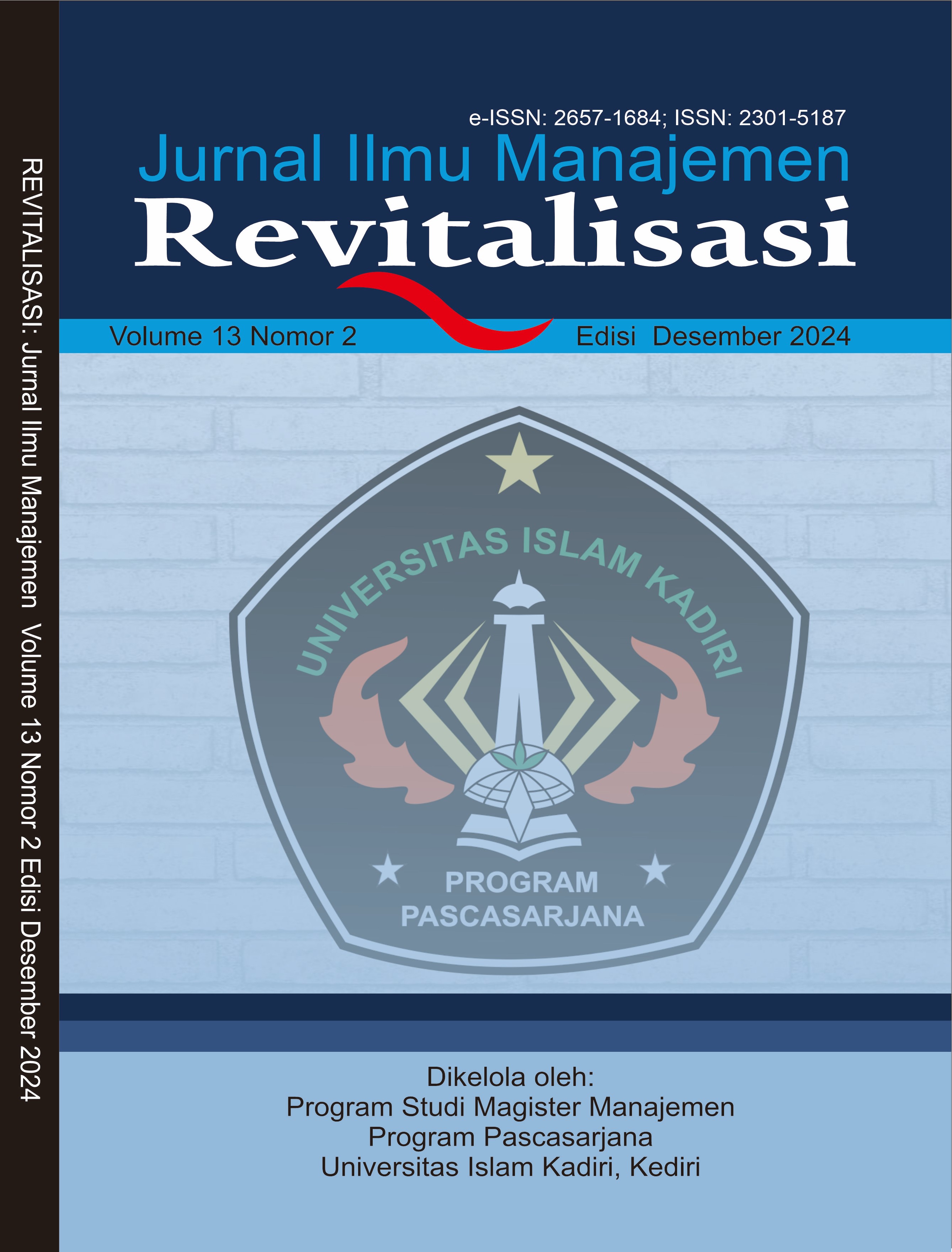Determinasi Faktor yang Mempengaruhi Tingkat Kemiskinan Kota/Kabupaten Wilayah Mataraman Jawa Timur ditinjau dari Maqasid Syariah
Abstract
This research investigates the factors influencing poverty levels in the cities and districts of the Mataraman region, East Java Province, within the framework of Maqasid Sharia. Employing a quantitative approach and secondary data analysis from 2018-2023. The data analysis technique used is multiple linear regression with the assistance of EViews 13 software to test the research data. The study focuses on education, Gini ratio, minimum wage, and Regional Gross Domestic Product (GDP) as variables affecting poverty. The findings indicate that education negatively impacts poverty, the Gini ratio correlates positively, minimum wage negatively affects poverty, while GDP shows a negative impact, albeit not significant. These results underscore the importance of education, income equality, adequate wages, and inclusive economic growth in poverty reduction efforts, aligned with the goals of Maqasid Sharia. The study recommends further exploration into health, financial access, and qualitative methods to enhance understanding and policy recommendations. Integrating Sharia economic principles could offer unique solutions in poverty eradication efforts.
References
Al-Qur’an dan Terjemahnya. (2016). Jakarta: Kementerian Agama RI
Becker, G. S. (1964). Human Capital: A Theoretical and Empirical Analysis, with Special Reference to Education. University of Chicago Press.
Becker, Gary S. (1975). Human Capital, A Theoretical and Empirical Analisys with. Special Reference to Education. 2nd Edition. National Bureau of Economic.
Belman, D., & Wolfson, P. J. (2014). What Does the Minimum Wage Do? Upjohn Institute for Employment Research.
Badan Pusat Statistik Jawa Timur. (2024). Provinsi Jawa Timur Dalam Angka 2024, Jawa Timur: BPS Provinsi Jawa Timur.
Burkhauser, Richard V and McNichols, Drew and Sabia, Joseph J. (2023). Minimum Wages and Poverty: New Evidence from Dynamic Difference-in-Differences Estimates. National Bureau of Economic Research. Doi:10.3386/w31182 http://www.nber.org/papers/w31182
Chapra, M. U. (2008). "The Islamic Vision of Development in the Light of Maqasid Al-Shariah". Islamic Research and Training Institute.
Creswell, J. W. (2014). "Penelitian Kualitatif & Desain Riset: Memilih di Antara Lima Pendekatan". Pustaka Pelajar.
Dabla-Norris, E., et al. (2015). Causes and consequences of income inequality: A global perspective. IMF Staff Discussion Note SDN/15/13. https://doi.org/10.5089/9781513555188.006
Deininger, K., & Squire, L. (1996). A New Data Set Measuring Income Inequality. World Bank Economic Review, 10(3), 565–591. doi:10.1093/wber/10.3.565
Dollar, D., & Kraay, A. (2002). Growth is Good for the Poor. Journal of Economic Growth, 7(3), 195-225.
Fatchullah El Islami, M., Room Fitrianto, A. (2023). Pengaruh Penyaluran Dana ZIS, Inflasi, Dan Gini Ratio Terhadap Tingkat Kedalaman Kemiskinan Satu Dekade. Jurnal Ilmiah Ekonomi Islam, IX (1). http://dx.doi.org/10.29040/jiei.v9i1.6994
Fitriyanto, D. (2021). Financial Inclusion Dan Pembiayaan Perbankan Syariah Dalam Mempengaruhi Perkembangan Umkm Serta Dampaknya Pada Pertumbuhan Ekonomi Indonesia. Commodities, Journal of Economic and Business , 1(4), 295-306. Retrieved from https://ejournal.ijshs.org/index.php/commo/article/view/292
Giovanni, R. (2018). Analisis Pengaruh PDRB, Pengangguran dan Pendidikan Terhadap Tingkat Kemiskinan di Pulau Jawa Tahun 2009-2016. Economics Development Analysis Journal, 7(1), 23-31. https://doi.org/10.15294/edaj.v7i1.21922
Gujarati, D. N., & Porter, D. C. (2009). Basic Econometrics (5th ed.). McGraw-Hill Education.
Hanushek, E. A., & Wößmann, L. (2015). The Knowledge Capital of Nations: Education and the Economics of Growth. Cambridge, MA: MIT Press.
Hanushek, Eric A., and Ludger Woessmann. 2008. "The Role of Cognitive Skills in Economic Development." Journal of Economic Literature, 46 (3): 607–68. DOI: 10.1257/jel.46.3.607 https://www.aeaweb.org/articles?id=10.1257/jel.46.3.607
Neumark, D., & Wascher, W. (2008). Minimum Wages. Cambridge, MA: MIT Press.
Psacharopoulos, G., & Patrinos, H. A. (2018). Returns to Investment in Education: A Decennial Review of the Global Literature. Education Economics, 26(5), 445–458. https://doi.org/10.1080/09645292.2018.1484426
Psacharopoulos, G., & Patrinos, H. A. (2018). Returns to investment in education: a decennial review of the global literature. Education Economics, 26(5), 445–458. https://doi.org/10.1080/09645292.2018.1484426
Ravallion, M. (2001). Growth, Inequality and Poverty: Looking Beyond Averages. World Development, 29(11), 1803–1815. doi:10.1016/s0305-750x(01)00072-7
Ravallion, M. (2001). Growth, inequality and poverty: Looking beyond averages. World Development, 29(11), 1803-1815. https://doi.org/10.1016/S0305-750X(01)00072-9
Ravallion, M. (2001). Growth, Inequality, and Poverty: Looking Beyond Averages. World Development, 29(11), 1803-1815. https://doi.org/10.1016/S0305-750X(01)00072-9
Sabia, J. J., & Burkhauser, R. V. (2010). Minimum Wages and Poverty: Will a $9.50 Federal Minimum Wage Really Help the Working Poor? Southern Economic Journal, 76(3), 592–623. https://doi.org/10.4284/sej.2010.76.3.592
Sala-i-Martin, X. (2006). The World Distribution of Income: Falling Poverty and Convergence Period. The Quarterly Journal of Economics, 121(2), 351–397. https://doi.org/10.1162/qjec.2006.121.2.351
Sanz, R., Peris, J.A., Escames, J. (2017). Higher education in the fight against poverty from the capabilities approach: The case of Spain La educacion superior ante la lucha contra la pobreza desde el enfoque de las capacidades: El caso de Espana. Journal of Innovation & Knowledge, 2(2). 53-66. https://doi.org/10.1016/j.jik.2017.03.002.
Savitri, C., Faddila, S.P., Irmawati, Iswari, H. R., Anam, C., Syah. S., Mulyani, S. R., Sihombing, P. R., Kismawadi, E. R., Pujianto, A., Mulyati, A., Astuti, Y., Adinugroho, W. C., Imanuddin, R., Kristia, Nuraini, A., & Siregar, M. T. (2021). Statistik Multivariat dalam Riset. Widiana Bhakti Persada Bandung.
Schultz, T. W. (1961). Investment in human capital. The American Economic Review, 51(1), 1-17.
Sen, A. (1999). "Development as Freedom." Oxford University Press.
Stiglitz, Joseph E., Theories of Wage Rigidity (1984). NBER Working Paper No. w1442, Available at SSRN:
Sumarto, S., Suryahadi, A., & Arifianto, A. (2004). Governance and poverty reduction: Evidence from newly decentralized Indonesia. SMERU Working Paper. https://dx.doi.org/10.2139/ssrn.858484
Todaro, M. P., & Smith, S. C. (2020). "Economic Development." 13th Edition. Pearson.
Valiant Kevin, A.., Bhinadi, A.., & Syari’udin, A. . (2022). Pengaruh PDRB, Angka Harapan Hidup, Dan Rata Rata Lama Sekolah Terhadap Kemiskinan Di Kabupaten/Kota Provinsi Jawa Tengah Tahun 2013-2021. Sibatik Journal: Jurnal Ilmiah Bidang Sosial, Ekonomi, Budaya, Teknologi, Dan Pendidikan, 1(12), 2959–2968. https://doi.org/10.54443/sibatik.v1i12.482
Wooldridge, J. M. (2016). Introductory Econometrics: A Modern Approach (6th ed.). Cengage Learning.

This work is licensed under a Creative Commons Attribution 4.0 International License.
 This work is licensed under a Creative Commons Attribution 4.0 International License
This work is licensed under a Creative Commons Attribution 4.0 International License




















